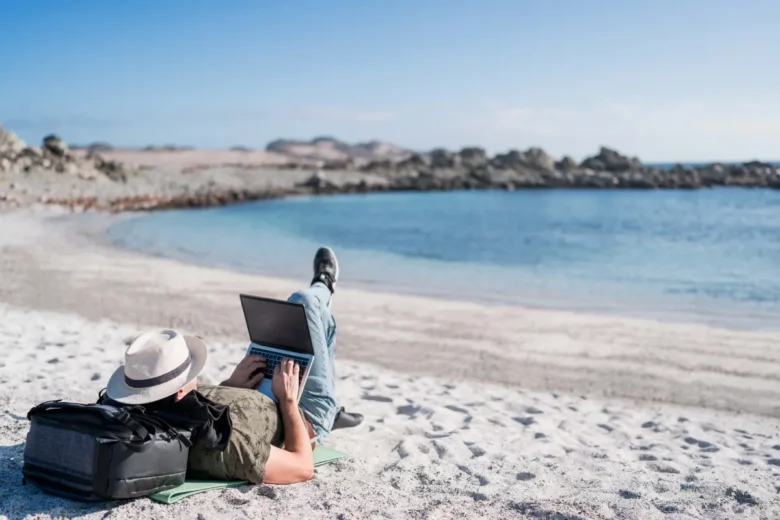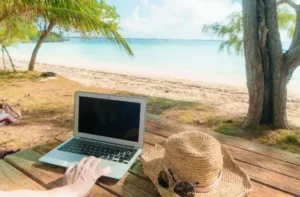As a digital traveler, you have more freedom than ever , but staying healthy can be challenging when you’re always on the go. Staying healthy can be challenging when you have a busy schedule, little knowledge about new foods, and can’t travel to many schools. This guide offers practical tips to help you maintain your physical and mental well-being while pursuing your dreams.
Challenges Faced
Digital nomads face health issues that most office workers don’t. Frequent travel can disrupt sleep habits, making it difficult to maintain a regular sleep schedule. Long flights or sitting at a computer for hours in crowded places can lead to poor posture and poor circulation. People who can’t cook often rely on restaurant meals or prepared meals, and language barriers can make understanding nutrition labels nearly impossible.
Changing time zones exacerbates these challenges by disrupting your body’s normal rhythm, affecting everything from energy to appetite. Finding reliable medical care abroad is more difficult than ever, especially if you have an ongoing illness or are taking prescription medications.
Nutrition on the Go
To stay healthy while traveling, you need to plan ahead and be creative. Before arriving at your destination, research local markets and supermarkets. Many Roma enjoy living in homes with a kitchen, even if it only has a stovetop and a small refrigerator.
Instead of buying food at the airport or supermarket, pack healthy, non-perishable snacks like nuts, dried fruit, and protein bars. If you eat out often, learn how to find healthier options on local menus. If you prefer grilled proteins and fresh vegetables over fried ones, street food can be a healthy alternative. Invest in a portable blender for smoothies. This will help you eat more fruits and vegetables, regardless of where you cook. If your diet isn’t perfectly balanced, taking a high-quality multivitamin can help you get the nutrients you need.
Exercise Anywhere
If you know what to do, you can stay active even without going to the gym. DIY exercises don’t require any special equipment and can be done anywhere. You can get a full-body workout while traveling with push-ups, squats, lunges, and dips. Walking is one of the best, and most underrated, forms of exercise for nomads. Wandering through unfamiliar cities is a wonderful way to get some exercise and discover hidden gems. Many nomads strive to take 10,000 steps a day, choosing the stairs over the elevator and walking to nearby locations instead of taking the bus or train.
Travelers can now stay healthy with the help of fitness videos on YouTube. High-intensity interval training (HIIT) is perfect for busy nomads because it only takes 15 to 30 minutes. Yoga videos are particularly helpful for combating the effects of prolonged sitting and poor posture.
Mental Health
People often prioritize physical health over mental health, but for travelers, mental health is just as important. Even if you regularly meet new people, you can still feel socially isolated. The joy of travel can offset the stress of constantly adapting to new environments. Develop daily habits that offer stability in a constantly changing environment. For example, meditate in the morning, write a book in the evening, or video chat with family regularly. A routine can provide mental support and help us maintain a balanced mindset.
Mindfulness can help you stay present, instead of constantly thinking about where you want to go. Many travelers report feeling like their thoughts are always racing and never truly settling into one place. Setting limits on your work hours can help you avoid a common pitfall: working constantly just for the sake of it.
Stay Connected
Technology makes nomadic living possible, but it shouldn’t replace personal connections. Joining a coworking space not only gives you free Wi-Fi but also allows you to connect with like-minded people. Many places have nomadic communities where people meet regularly.
Stay in touch with family and friends back home. Instead of random texts, schedule phone calls at fixed times. These tasks can be tricky due to time differences, but consistency is more important than frequency. To find the best time to call, consider using an app that supports multiple time zones. Don’t forget your business contacts either.
Maintaining Your Nomadic Health Journey
As a digital traveler, you need to plan ahead and stay flexible in order to stay healthy. The key is to build adaptable systems, not static ones. Remember that growth is more important than perfection. It’s normal to outperform others. Remember that your health journey will evolve as you change. What works in Southeast Asia might not work in South America. That’s part of the fun. Be open to the food and health practices of your region, but stick to the habits that keep you grounded.
Nomadic living requires more independence in your health choices, but it also offers unique wellness opportunities that standard living doesn’t. Be brave and let your travels enhance your health instead of jeopardizing it.
FAQs
1. What are my healthcare options as a nomad?
Before traveling to a country, research the local healthcare system and consider purchasing travel insurance that covers nomads. Many countries offer excellent private healthcare and are affordable for tourists. Apps like Allianz Care and SafetyWing can help you find medical care nearby.
2. What should I pack to stay active?
Yoga mats, resistance bands, and jump ropes are all lightweight and practical options. Many travelers also bring running shoes and waterproof workout gear. Fitness trackers can help you track your activity level and sleep duration.
3. How can I eat healthy without a kitchen?
Focus on simple, healthy meals that don’t take too long to prepare. You can prepare salads, sandwiches made with high-quality vegetables, and dishes like oatmeal and couscous using just hot water. Many hikers buy a small, portable kettle to prepare simple meals.
4. How do I cope with jet lag and different time zones?
If possible, gradually change your sleep patterns before your vacation. Take advantage of sunlight as soon as possible after arrival to reset your body clock. Avoid alcohol or caffeine before bed, and if you’re experiencing severe jet lag, you may need to take a melatonin supplement.
5. How can I stay motivated to exercise if I don’t go to the gym every day?
Instead of making ambitious workout plans, set small, achievable goals. Instead of forcing yourself to do something you don’t enjoy, try doing something you enjoy, like dancing, walking, or swimming. Exercising with friends, even if only online, can help you stay motivated.




